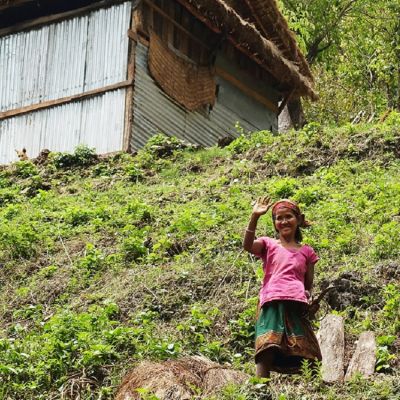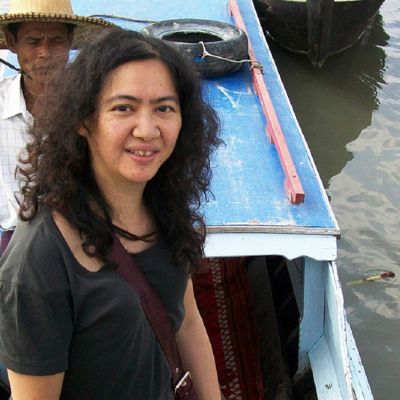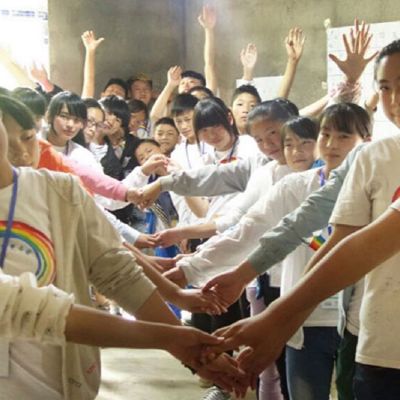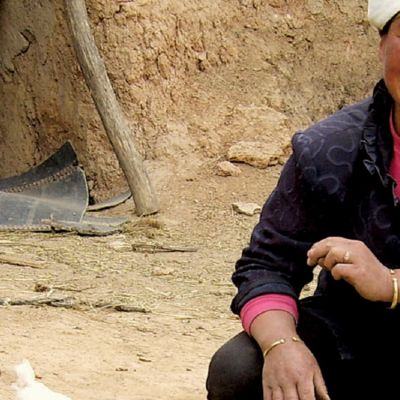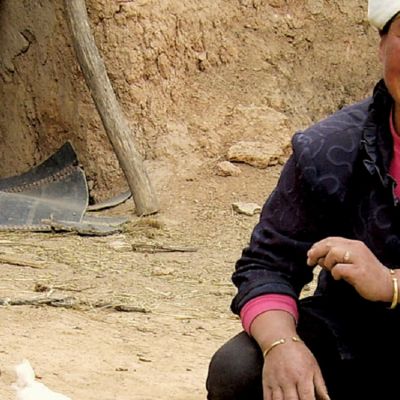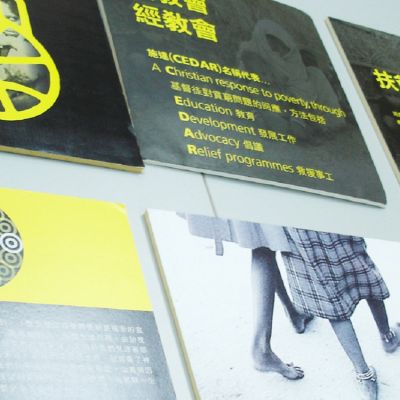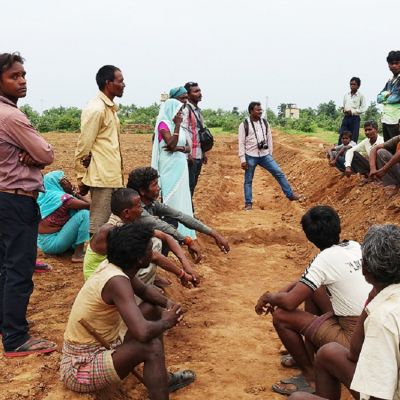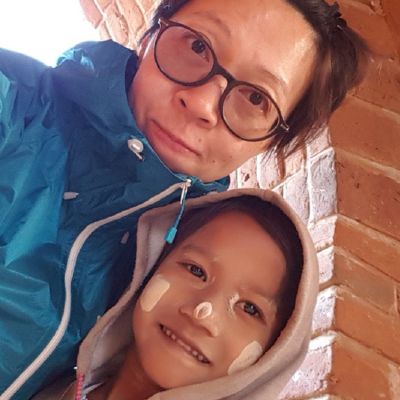Interviewee: Grace Lai (Head of Partnership Development)
Interviewed and edited by: Jojo Poon
People take part in poverty relief works with different reasons. For Grace, the seed to care for the poor was sowed and rooted in her heart since her childhood years. “Every time the TV showed a commercial from a development aid organisations, I would be deeply moved… After I became a Christian, I wanted to do something meaningful. The moment came when I was changing jobs, where I recollected those old thoughts in my heart. I wanted to enter the poor’s community and live with them. Therefore, I began to realise this childhood dream by joining the development field.”
About 10 years ago, Grace went to Guizhou and Guangxi, and there began her walk with the poor. Before entering the field, Grace thought that visiting villagers and giving them material aid would be good enough to help the community develop. It was only after she got involved in development work that she realised this was not the case. “Some charitable organisations helped villagers by means of materials in kind or in cash. As time went by, villagers developed a mindset that external resources were better. Without intervention from foreign institutions, villagers could not live proper lives. All these only made the community even ‘poorer’, especially in their thinking.”
Grace points out that poverty alleviation should not work this way. “It is neither about teaching villagers what to do and how to do it, nor is it about giving them material things or knowledge in a privilege status. Rather, we, as an ordinary person, should discuss with the villagers about something they know well: their daily lives, their cultural customs, and their ancestral wisdom. Integrating into the local culture is our primary task; in order words, we should listen and learn rather than teach.”
In the face of the overwhelming belief among local officials and communities that building hardware or giving financial support is the best way to improve their living quality, Grace tried to pull the community together and encourage active participation. After a few attempts, villagers finally came to realise that the community shared responsibility in owning, building, and maintaining public facilities. Grace says that that particular experience benefitted the entire community, where the village as a whole has experienced the changes and built a shared culture among themselves.
“It’s quite interesting to see how development work unfold in each and every community. We may not be able to see the result instantly, but it is a definite joy to witness the growth of villagers throughout the process.” Grace stressed that the responsibility of development workers is to help the beneficiaries learn about their rights and be able to enjoy them. Every person, including the poorest of the poor, women and children, should be able to enjoy social services that cover the basic needs of their life. “We facilitate villagers to assess and analyse their living condition, and encourage them to take necessary action to improve their lives. That way, the community can take ownership in choosing appropriate development strategy that cater to their own needs and can sustain their community’s development.”
What impressed Grace the most is the changes female villagers made. “Given the belief that men are superior to women, women in the community generally take up the role of a caregiver in a family. Rarely are they given any chance to express themselves. Therefore, we would encourage villagers to let women help organise activities in major festivals for them to explore their talents beyond handling housework.” According to Grace, things started to change when one village was willing to try, other villages would follow. Gradually, more and more villages would be happy to include women in the discussion of different matters. “I remember an occasion when some women came to me, sharing their happiness of becoming representatives of women in their villages. They reinforce the building of fences along the river to prevent children from falling into it during summer. They were proud of themselves and they felt like they were living meaningful lives.” The sharing of these women is the best reward to Grace’s commitment to development work.
So, what makes someone like Grace who is so dedicated in serving the poor come back to Hong Kong? “Most Hong Kong people don’t know or agree to the rationale behind community development work. I hope by various ways of personal sharing, more people would come to grips with anti-poverty development, and there will be a paradigm shift among those who have been supporting poverty relief work.” May the aspiration of Grace to bring changes be blessed by God and lead to more life transformation.
Content of this issue
Written and edited by: Jady Sit, Jojo Poon At noon on 25 April 2015, Nepal was hit by the strongest earthquake in 80 years. Countless families lost their loved ones, homes, and properties. Approximately one third of Nepal’s population, 8 million, was affected by the quake. In the midst of ruthless disaster, people responded with love. Shortly after the earthquake, the world quickly pooled their resources to help. Yet, when global news coverage died down and emergency relief phased out, this was when we began to walk with the affected communities, helping them to rebuild and recover their communities sustainably for the long run. In the last decade, CEDAR has been supporting partners’ community development work in mountainous…
Written by: Lisa Chai (Former CEDAR colleague, currently involved in community development work in Myanmar) We are in the midst of a global refugee crisis. From Syria to Iraq, DR Congo to Yemen, and today we are witnessing the world’s largest growing refugee influx across the border of Bangladesh after violence broke out at northern part of Myanmar in Rakhine State in late August last year. As of 12 November 2017, the UN estimated that over 610,000 people have fled to Myanmar and the number is still growing. How do we react to all the violence and suffering in the world when their impact comes so strong and destructive? In the book of Lamentation we read of the…
“Left-behind Children”, a term describing over 60 million children in China who stayed behind with their grandparents in rural areas while their parents are working in the cities. While not all left-behind children suffer from poverty as their parents work far away from home, they all suffer the lack of parental care and love, and bear emotional burdens due to this long-term void. CEDAR’s partner in Sichuan, Chengdu Fuyi Community Services Centre, began supporting youths in quake-affected communities through caring and training programmes after the 2008 earthquake in Wenchuan, Sichuan. Two more earthquakes happened in Ya’an, Sichuan and Zhaotong, Yunnan in 2013 and 2014 respectively, leading to the expansion of our partner’s service to the youths in those…
Written and edited by: Jojo Poon I enjoy hearing stories and sharing of different development workers very much. If we put their sharing together, then we would get a complete picture of God’s purposes for the poor and the world. For this issue’s “Taking Action”, we invited CEDAR’s staff from different eras to share about their learnings and experiences along the way to put together a blueprint for CEDAR. “We were in Gansu’s Hui village working on the project… When we conducted home visits, we would ask: ‘Is anyone home?’, and if there were only women in the house, they would answered: ‘No!’” shares Alice, who served in Gansu, China. “We spent half a year to build relationship…
Interviewee: Alice Kwan (Former CEDAR Staff) Interviewed and edited by: Jojo Poon How far would you go for the poor? Would you visit the Guangdong industrial district alone to investigate sweatshop labour, or venture to Northwest China alone and live among the Hui people, or supervise earthquake rescue efforts while carrying a baby in your tummy and worrying about your husband’s safety who is responding at the frontline, or devote your family as a fulltime volunteer for four years, only to wake more hearts to care for the poor? That was Alice Kwan’s story. Alice had served in CEDAR for 12 years, 4 of which were spent supporting the community development projects in rural communities in Gansu, China….
Interviewees: Bonnie Ho (Administrative Staff) & Cee Foong Fung (Former colleague of CEDAR) Interviewed and Edited by: Jojo Poon Bonnie and Cee Foong had been serving CEDAR for over 20 years. Although they worked in the supporting role at the office, but that did not make them less knowledgeable about development work than others working in the same field. Such was evident during one of our regular morning meetings, the host led us to think in the shoe of the poor and we were to think about what their expected results for their community were after a project commenced. At the end, they both gave the most sensible answers. Bonnie has always been managing our accounting and finance,…
Interviewee: Fountain Chik (Senior Programme Officer) Written and edited by: Jojo Poon “Previously, I have worked in Tung Chung, Sham Shui Po, and Yuen Long before.” Many of us know that Fountain is the “Bangladesh guy” or “Prince of Bangladesh” at our office, but little have heard of his story before CEDAR. He says he began in community work locally. From different times of his service, there has always been one unified goal – to look for God’s footprint wherever he goes. When he was working in Tung Chung, Fountain was assisting community members on job employment as a social worker. Due to its long distance from business districts and to save on transportation fees, low-income residents in…
Interviewee: Grace Lai (Head of Partnership Development) Interviewed and edited by: Jojo Poon People take part in poverty relief works with different reasons. For Grace, the seed to care for the poor was sowed and rooted in her heart since her childhood years. “Every time the TV showed a commercial from a development aid organisations, I would be deeply moved… After I became a Christian, I wanted to do something meaningful. The moment came when I was changing jobs, where I recollected those old thoughts in my heart. I wanted to enter the poor’s community and live with them. Therefore, I began to realise this childhood dream by joining the development field.” About 10 years ago, Grace went…
Interviewee: Rebecca Lee (Senior Programme Officer) Interviewed and edited by: Jojo Poon Devotees in the development industry often started out with a calling derived from a unique personal experience. For Rebecca, our Senior Programme Officer, that special experience took place during her university years. She was pursuing a degree in International Politics, and one of the subjects was International Relations. It was her first time acknowledging the wide disparity between the world’s rich and poor, “I didn’t think God intended the world to work this way: while some people were starving to death, others enjoyed excessive abundance. This was clearly wrong. I wanted to do something to make the world a better place,” Rebecca says. Since then, to…



